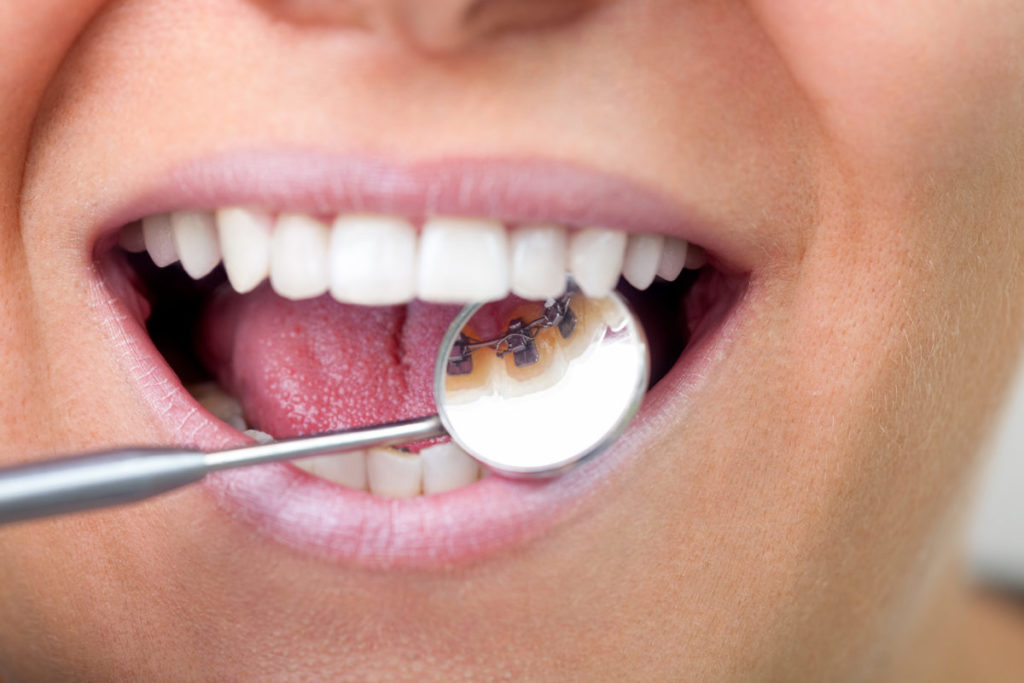You know you want to put the days where you are too embarrassed about the condition of your teeth to smile behind you, but finding the right type of orthodontic treatment is a big decision. If you would prefer treatment that is less noticeable, lingual braces and Invisalign aligners are probably on your radar, but is one better than other?
Lingual braces vs. Invisalign: Which is best for me? Here is what you need to know:
Lingual Braces
Lingual braces are braces that are attached to the back of the teeth instead of the front making them practically invisible to the people around you. They are made up of brackets and wires like traditional braces, but because of their positioning they are more discrete.
Unfortunately there are some bite conditions that cannot be treated with lingual braces. Patients with a deep overbite are not good candidates for lingual braces because the overbite might put too much pressure on the brackets leading to the brackets falling off. During an evaluation, your orthodontist will be able to determine if lingual braces will work for you.
Another concern is that not all orthodontists offer this type of treatment. It requires special training because the wiring work is more intricate than it is with traditional treatment. Another concern is that they can be more difficult to clean properly because it is on the back of your teeth which is harder to reach.
Here are some difficulties that you may experience with lingual braces:
- You may have difficulties with speech. Because the braces are on the inside of your teeth, it will feel a little strange at first and you may experience some speech difficulty like a lisp until you get used to them. What is exactly happening is that the tongue usually hits the back of the teeth to make sounds and now it can’t. The good news is that your tongue will eventually train itself to find a different place in the mouth.
- Because your tongue will be hitting up against the brackets, your tongue may develop sores until it get toughened up. To help with any pain or discomfort you make feel, rinse your mouth in warm saltwater or use over-the counter pain medicine that is safe to use to numb your tongue.
- You will have food restrictions like you do with traditional metal braces. You will need to avoid foods that are hard and very crunchy and those that are very sticky. A good rule of thumb is to always cut up your food into smaller pieces before eating.
Don’t let these issues scare you away though. The technology used to create lingual braces is changing every day and getting more comfortable. Today the brackets are lot smaller and more rounded and sharp edges is not as much of an issue anymore.
Invisalign Aligners
Invisalign aligners are clear, plastic aligners that are removable. You can easily remove them when you eat and drink and brush your teeth. The metal brackets and wires used in braces, however, remain in your mouth permanently until the orthodontist removes them.
The Invisalign 3D technology allows your orthodontist to create a step by step plan for your treatment so you will know what to expect every step of the way. The orthodontist will take x-rays and impressions of your teeth to create a 3-D image of your teeth and then uses this to map the exact movement of teeth needed to straighten them out. Once the plan is in place, your first set of aligners will be custom fit to your mouth and you will need to wear them for at least 20-22 hours a day. If you don’t wear them for the prescribed amount of time, you will risk delaying your treatment so be diligent about wearing them.
Only certain teeth will be moved at a time. The Invisalign aligners control not only control how much force is exerted on your teeth, but the timing of it. Your aligners will be switched out every two weeks as your teeth gradually shift into better alignment so expect more frequent trips to the orthodontist.
Besides the fact that they are practically invisible and removable, other benefits of Invisalign includes that there are no food restrictions because you can remove the aligners when you eat. Brushing and flossing your teeth is also easier because you can remove them. The one big rule for wearing Invisalign aligners is that you need to keep them in your mouth 20 to 22 hours a day. If you don’t, you will end up delaying treatment and you won’t be done as quickly as you would like.
What Is the Cost Difference Between Invisalign and Lingual Braces?
Unfortunately both Invisalign and lingual braces tend to me more expensive than traditional metal braces, but it does depend on your dental insurance coverage.
Financial considerations can be a big factor in your decision too. Don’t be afraid to shop around and get an idea of price from different orthodontists so you can make an educated decision about what is the best treatment path for you.
Most orthodontists will offer you different payment options so definitely talk costs during your consultation. You might be surprised by what is actually feasible.
Good Oral Hygiene Is a Must No Matter What
No matter which type of treatment you choose, practicing good oral hygiene. This doesn’t just mean brushing daily, but also flossing every day and taking care to make sure food particles are not getting stuck in the wires or stuck between your teeth and the aligners. Ask the orthodontist about any tips they can suggest on how to make it easier to take care of your teeth during orthodontic treatment.
The most important thing to remember is that your oral health affects so many other aspects of your life, your overall physical health and your mental health that it is definitely not something to ignore. If you don’t take care of any problems now, you will have a more serious and more expensive situation later in life.
Need to know more about the pros and cons of lingual braces and Invisalign? Contact Orthodontics Limited today.



